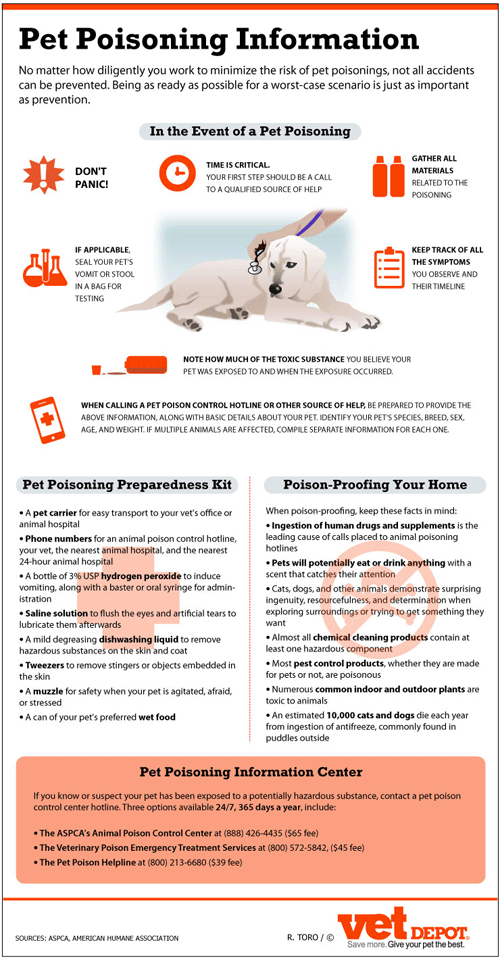If you know or suspect your pet has been exposed to a potentially hazardous substance, contact a pet poison control center hotline. Three options available 24/7, 365 days a year, include:
- The ASPCA's Animal Poison Control Center at (888) 426-4435 ($65 fee)
- The Veterinary Poison Emergency Treatment Services at (800) 572-5842 ($45 fee)
- The Pet Poison Helpline at (800) 213-6680 ($39 fee)
In the Event of a Pet Poisoning

While it's always easier said than done, don't panic if you know of or suspect a pet poisoning. In an emergency, your pet counts on you to keep calm and get help. However, time is critical. Your first step should be a call to a qualified source of help.
Gather all materials related to the poisoning. Safely contain a sample of the substance, if possible, and get the product's container or packaging. If applicable, seal your pet's vomit or stool in a bag for testing. Keep track of all the symptoms you observe and their timeline, and note how much of the toxic substance you believe your pet was exposed to and when the exposure occurred.
When calling a pet poison control hotline or other source of help, be prepared to provide the above information, along with basic details about your pet. Identify your pet's species, breed, sex, age, and weight. If multiple animals are affected, compile separate information for each one.
Poison-Proofing Your Home
About 150,000 people call the ASPCA's Animal Poison Control Center (APCC) every year with questions about pet exposure to toxins, and it's just one of the major nationwide pet poisoning hotlines. At home and outdoors, cats, dogs, and other companion animals are at risk of exposure to countless hazardous substances, including harmful food and beverages, plants, cleaning and automotive chemicals, pharmaceutical products, insecticides and other pest control chemicals, lawn care products, and more.
Poison-proofing your home to prevent accidental pet poisonings is critical. Like young children, pets are unable to identify dangers, are curious about their environment, and are very susceptible to toxicity. Ingesting a toxic substance can cause considerable pain and suffering. It can also be fatal.
When poison-proofing, keep these facts in mind:
- Ingestion of human drugs and supplements is the leading cause of calls placed to animal poisoning hotlines
- Pets will potentially eat or drink anything with a scent that catches their attention
- Cats, dogs, and other animals demonstrate surprising ingenuity, resourcefulness, and determination when exploring surroundings or trying to get something they want
- Almost all chemical cleaning products contain at least one hazardous component
- Most pest control products, whether they are made for pets or not, are poisonous
- Numerous common indoor and outdoor plants are toxic to animals
- An estimated 10,000 cats and dogs die each year from ingestion of antifreeze, commonly found in puddles outside
Pet Poisoning Preparedness
No matter how diligently you work to minimize the risk of pet poisonings, not all accidents can be prevented. Being as ready as possible for a worst-case scenario is just as important as prevention. Like assembling a human or pet first aid kit, putting together a poison preparedness kit prevents panic in the event of an emergency and shaves crucial time off your response.
A basic pet poisoning preparedness kit should include:
- A pet carrier for easy transport to your vet's office or animal hospital
- Phone numbers for an animal poison control hotline, your vet, the nearest animal hospital, and the nearest 24-hour animal hospital
- A bottle of 3% USP hydrogen peroxide to induce vomiting, along with a baster or oral syringe for administration
- Saline solution to flush the eyes and artificial tears to lubricate them afterwards
- A mild degreasing dishwashing liquid to remove hazardous substances on the skin and coat
- Tweezers to remove stingers or objects embedded in the skin
- A muzzle for safety when your pet is agitated, afraid, or stressed
- A can of your pet's preferred wet food
Sources
http://www.americanhumane.org/animals/adoption-pet-care/safety/pets-poisons.html
http://www.aspca.org/pet-care/animal-poison-control/what-do-if-your-pet-poisoned
http://www.aspca.org/pet-care/animal-poison-control/poison-safe-home
http://www.thepreventivevet.com/stats.html
The above is provided for information purposes only and should not be used for the diagnosis or treatment of any condition.
This information does not cover all possible variables, conditions, reactions, or risks relating to any topic, medication, or product and should not
be considered complete. Certain products or medications may have risks and you should always consult your local veterinarian concerning the treatment of
your pet. Any trademarks are the property of their respective owners.